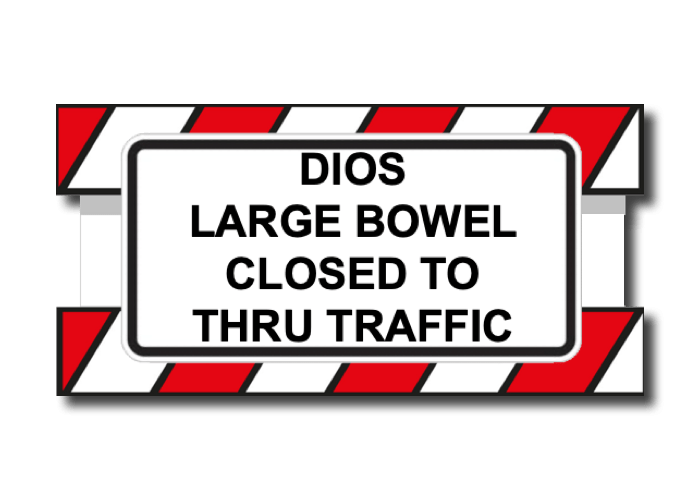Distal Intestinal Obstruction Syndrome and Cystic Fibrosis

Constipation – no one wants to think about it or deal with it, but we often blame the Chronic Recurrent Abdominal Pain (CRAP) on it. Clearly there are other items on the Ddx list for the child with abdominal pain including Intussusception, Malrotation, Appendicitis, but once someone says that there is a history of constipation, suddenly our working Ddx whittles down rapidly. Since we are all vigilant clinicians, however, we remain aware of the potential pitfalls that exist in this area – like Ogilvie’s Syndrome, Cecal Volvulus and Sigmoid Volvulus. There is one special patient population that warrants specific consideration with respect to constipation. Patients with Cystic Fibrosis are often dealing with issues of constipation; however, they are also at risk for another intestinal problem. Let’s take a minute to digest a morsel on Distal Intestinal Obstruction Syndrome (DIOS) and Cystic Fibrosis (CF):
Distal Intestinal Obstruction Syndrome (DIOS): Basics
DIOS is due to thick intestinal secretions that obstruct the intestines
- Patients with CF have dysfunctional chloride channels. PMID:Wrong Shortcode Contents
- Leads to dehydrated airways… and all of the subsequent pulmonary issues.
- Also leads to dehydrated bowel lumen… as well as pancreatic exocrine impairments (which also plays a role).
- DIOS is akin to meconium ileus. PMID:Wrong Shortcode Contents
- Meconium ileus (occurs in ~10% of neonates with CF) is also related to thickened intraluminal material that plug up the intestines.
- DIOS affects older patients (so not meconium-related) and the improved survival of patients (ie, living longer) may lead to increased incidence of cases.
- Can develop DIOS at any age, but… PMID:Wrong Shortcode Contents
- more often over the age of 15 years.
- peak ages are young adults (20-25 years).
DIOS is different from constipation and mechanical obstruction.
- Patients with CF are at risk for functional constipation,
- Both adults and children with CF are prone to have constipation – ~47% of CF patients will experience constipation. [PMID – 30075058 – Green, 2018]
- Patients with CF have constipation that is usually subacute in presentation.
- Increased consistency of stool over last few weeks or months
- Decreased frequency of bowel movements over last few weeks or months.
- DIOS is a more several obstructive process due to the concentrated materials in the GI lumen. [PMID 31364217 – Hort, 2020]
- Material often gets stuck/plugged at the ileo-colic junction.
- DIOS has a rapid onset of symptoms.
- DIOS is also not managed like typical mechanical intestinal obstruction. [PMID 31364217 – Hort, 2020; PMID – 30075058 – Green, 2018]
- Making patients NPO would further dehydrate the intestine’s lumen.
- Gastric suctioning would also dehydrate the lumen.
DIOS can be characterized as Complete or Incomplete.
- DIOS refers to the presence of Abdominal Pain and/or Distention often with a palpable Fecal Mass in the Right Lower Quadrant (ileo-cecal region).
- Complete DIOS has combination of: PMID:Wrong Shortcode Contents
- Complete obstructive findings (ex, bilious emesis, air-fluid levels on imaging) AND
- Fecal mass in RLQ AND
- Abdominal pain or distention or both.
- Incomplete DIOS has combination of: [PMID 31364217 – Hort, 2020]
- No signs of complete obstruction AND
- Fecal Mass in the RLQ AND
- Short history (ie, days) of abdominal pain or distention or both.
Risk Factors of developing DIOS. [PMID 31364217 – Hort, 2020 ]
- More severe genotype of CF
- Prior history of having DIOS
- History of meconium ileus at birth
- Alteration in pancreatic enzyme intake
- Dehydration or dietary changes
- CF-related diabetes
- Lung transplantation
- New narcotic analgesia use
Distal Intestinal Obstruction Syndrome (DIOS): Evaluation & Management
Keep DIOS on Ddx of patient with CF and abdominal pain / distention [PMID 31364217 – Hort, 2020]
- It is easy to blame symptoms on constipation when patient has a history of constipation, but DIOS is more problematic.
- 1-2% will develop Intussusception
- Volvulus can also occur.
- Colonic perforation is also a complication.
- 33% to 81% will have recurrent episodes.
- The Ddx is further complicated when patient has had a prior abdominal surgery as now mechanical obstruction is also competing for top billing.
Imaging may be warranted. [PMID 31364217 – Hort, 2020]
- Abdominal pain films may show:
- Air-Fluid Levels
- Absence of rectal gas
- Bubbly, granular appearance in distal ileum (“Neuhauser sign” – similar finding seen with meconium ileus)
- Abdominal CT imaging is most useful in evaluating other possible entities on the Ddx.
DIOS Management [PMID 31364217 – Hort, 2020]
- Unlike mechanical obstruction, management should not consist of bowel rest and suctioning of the lumen (both would further concentrate the thick materials).
- Given the complexity of CF, it is important to involve a multidisciplinary CF team in the management of these patients. [PMID 24237857 – Subhi, 2014]
- There is no well-formulated guidelines, but some recommendations include: [PMID – 30075058 – Green, 2018; PMID 24237857 – Subhi, 2014]
- Rehydrate the patient and fix any abnormal electrolytes.
- Laxatives
- Polyethylene glycol
- Gastrograffin orally
- Lactulose
- Large volume enemas
- Medical management is preferred, but occasionally surgery is required.
- Intestinal lavage via appendicostomy
- Enterotomy and lavage
- Temporary stoma
- Resection
Moral of the Morsel
- Sticky Poop is tough on the intestines! Tenacious, concentrated, and dehydrated stool can cause more than “simple constipation.”
- RLQ pain and mass in a CF patient? Don’t blame it on “simple constipation.” Constipation typically leads to left sided fecal material… if it is on the right, there is something atypical going on.
- Obstructive symptoms in a CF patient? Don’t reflexively start NPO status and gastric suctioning… that will make DIOS worse. Start IV fluids and consult CF team. Patient likely will need multidisciplinary team and careful bowel management and monitoring.

